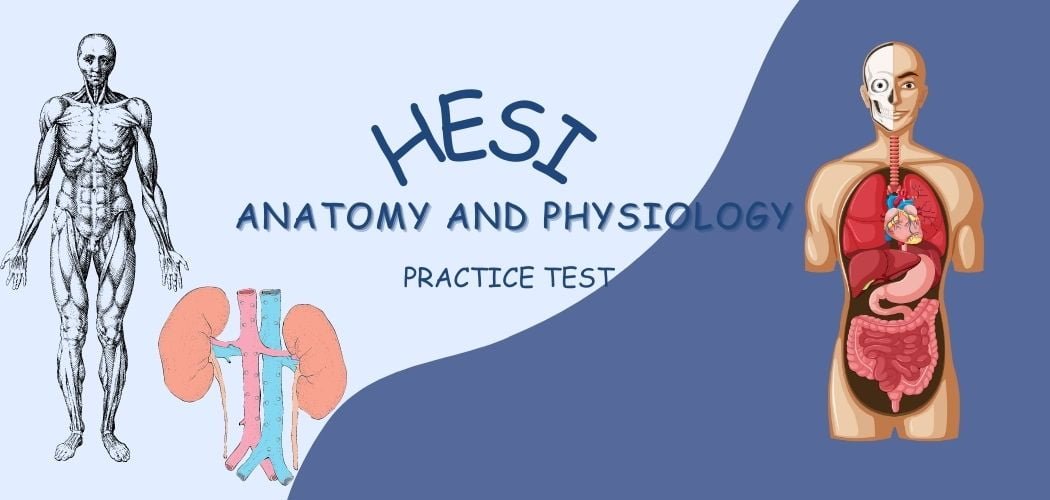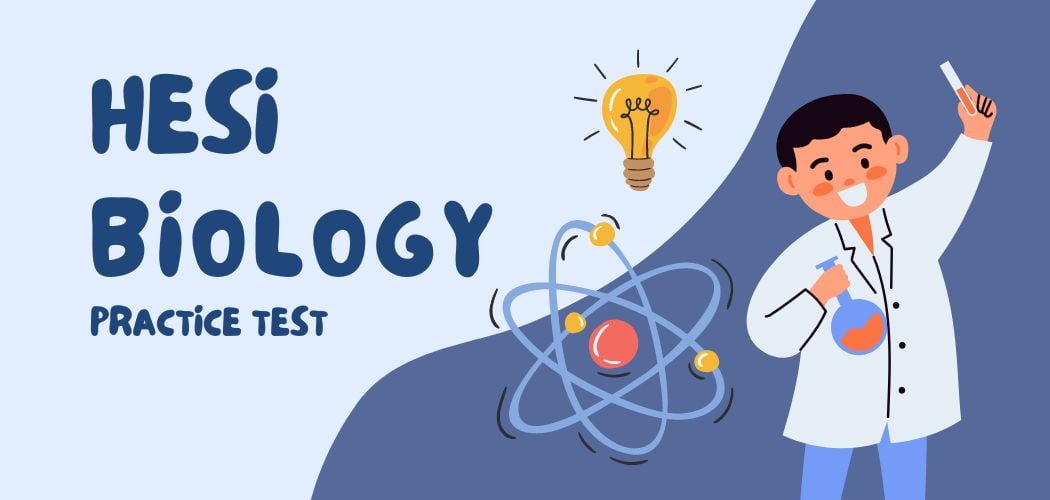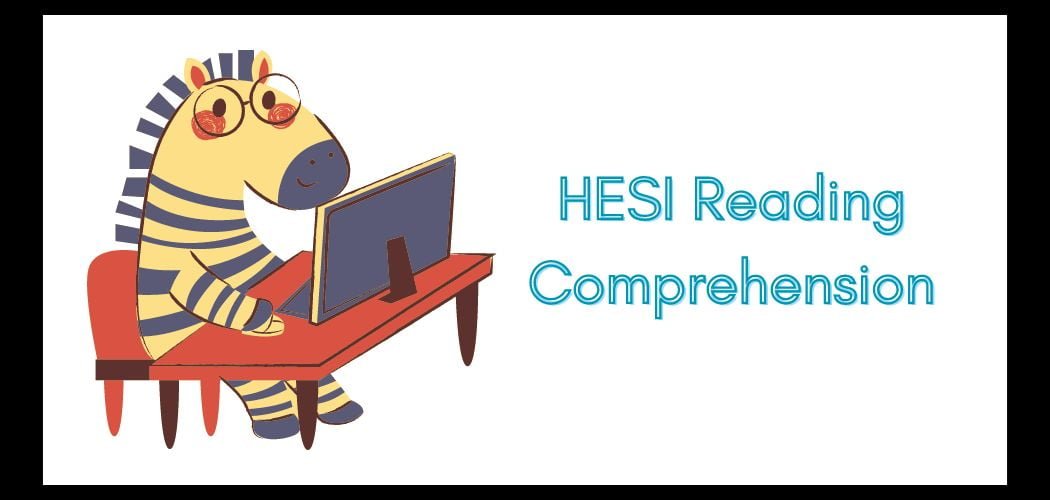Overview: The HESI Vocabulary test consists of 50 multiple choice questions which must be completed within 50 minutes. It covers specific medical terms as well as general vocabulary that is often used in the healthcare field.
These free HESI Vocabulary test answers will help you review many of these important terms to assist with your test prep, review, and see if you’re ready for the real deal.
HESI Vocabulary Practice Test
Each time this test is loaded, you will receive a unique set of questions and answers. The test questions are scrambled to protect the integrity of the exam.
Question 1. A patient’s chart indicates that he has been having trouble with respiration. What action is the patient struggling with?
A. Breathing✅
B. Movement of limbs
C. Forming coherent sentences
D. Interaction with others
Question 2. Select the meaning of the underlined word in the sentence.
Annika was having a hard time coming to terms with the fact that her chronic condition would keep her from pursuing figure skating.
A. New
B. Painful
C. Enduring✅
D. Debilitating
Question 3. Select the meaning of the underlined word in the sentence.
The doctor only gave the wound a cursory glance before knowing it was infected.
A. Brief✅
B. Thorough
C. Concerned
D. Knowledgeable
Question 4. What is the best definition for the word “predispose”?
A. To show interest
B. To make susceptible✅
To dispose of an item before using
To be cautious of bias
Question 5. What is the best definition of the word “symptom”?
A. The cause of a disease or disorder
B. The evidence of a disease or disorder✅
C. A disease or disorder that presents itself physically
D. An ailment that causes pain or discomfort
Question 6. Cassandra is an inpatient at the hospital due to a rare hematologic disease. What part of her body does the disease impact?
A. Small intestine
B. Heart
C. Muscles
D. Blood✅
Question 7. How is sublingual medication administered to a patient?
A. Injected into a muscle
B. Absorbed through the skin
C. Placed beneath the tongue✅
D. Sprayed through a nostril
Question 8. Select the meaning of the underlined word in the sentence.
The pharmacy was forced to cease operations until the power was restored.
A. Alter
B. Halt✅
C. Effect
D. Ruin
Question 9. Select the meaning of the underlined word in the sentence.
The concerned parents rushed to the hospital, but luckily, the substance their child ingested was non-toxic.
A. Swallowed✅
B. Applied the body
C. Vomited
D. Drank
Question 10. Which word most closely means “an unfilled area within a mass”?
The pleura is a delicate serous membrane that lines the chest cavity and outside the lungs.
A. Cavity✅
B. Pleura
C. Membrane
D. Serous
Question 11. Select the meaning of the underlined word in the sentence.
Alan asked his professor for modifications to his verbal foreign language test since he was hearing impaired.
A. Unable to experience something
B. Unable to process something physically or mentally
C. Able to function properly
D. Diminished in function✅
Question 12. A patient’s chart notes that typical treatments for their disease only seem to exacerbate the symptoms. What does exacerbate mean here?
A. Mitigate
B. Worsen✅
C. Assuage
D. Complicate
Question 13. Select the meaning of the underlined word in the sentence.
The ingestion of toxic substances by small children can be an incredible danger under inattentive parents.
A. Unsafe
B. Inedible
C. Irregular
D. Poisonous✅
Question 14. Select the word that means “existing in possibility”.
The potential impacts of the infection were of heightened concern due to Omar’s preexisting conditions that affected his immune system response.
A. Potential✅
B. Preexisting
C. Affected
D. Response
Question 15. Select the meaning of the underlined word in the sentence.
Penny experienced acute trauma to the occipital lobe from the attack, resulting in a grueling and emotionally exhausting rehabilitation process.
A. Injury to living tissue✅
B. Severe pain with lasting ramifications
C. An event or injury causing disability
D. Extreme emotionality
Question 16. A patient comes to urgent care after experiencing acute pain in the abdomen. How is “acute” pain characterized?
A. Undefined in cause or region
B. Severe impacts or effects
C. Sharp or with a severe sudden onset✅
D. Uncomfortable and almost unmanageable
Question 17. Select the meaning of the underlined word in the sentence.
The absolute contraindications of the procedure meant that, unfortunately, the doctor could not authorize the operation.
A. The overall risks of a procedure or treatment
B. Something that makes treatment impossible
C. Something that makes a treatment inadvisable✅
D. The physical requirements of a procedure
Question 18. Select the meaning of the underlined word in the sentence.
In order to treat the patient suffering from achalasia, the doctor had to dilate his esophagus.
A. Surgically alter
B. Expand✅
C. Open
D. Heal
Question 19. A patient’s chart includes the chronology of her condition’s progression. What is on this chart?
A. A list of the chronic symptoms and their progression as time goes on
B. A list of worsening symptoms throughout the patient’s time of treatment
C. A timeline of events relating to the progression of the condition✅
D. A record of the mental state of the patient as her condition progresses
Question 20. Select the word that means “showing simultaneous but contradictory feelings.”
Despite the oncologist’s persistent assurance that the treatment’s success was ubiquitous, the patient remained ambivalent to the suggestion of undergoing it.
A. Persistent
B. Ubiquitous
C. Undergoing
D. Ambivalent✅
Question 21. Select the word that means “feverish.”
The virulent infection caused a febrile condition that could be fatal if not properly mitigated.
A. Virulent
B. Febrile✅
C. Fatal
D. Mitigated
Question 22. Select the meaning of the underlined word in the sentence.
Despite Juan’s fears, his practitioner assured him that the necessary laparoscopy was minimally invasive.
A. Involving entering the body✅
B. Involving the use of surgical instruments
C. Requiring lengthy stay at a healthcare facility
D. Causing acute pain or difficult recovery
Question 23. Select the word that means “the prospect of recovery.”
Despite the practitioner’s concerning initial diagnosis, the patient’s bodily response to hydration and medication led to a hopeful prognosis.
A. Diagnosis
B. Prognosis✅
C. Response
D. Hydration
Question 24. Select the meaning of the underlined word in the sentence.
The healing of Juan’s stitches was contingent on his ability to stop scratching at them.
A. Based on
B. Independent of
C. Dependent on✅
D. Slightly affected by
Question 25. A patient has a fracture in the distal end of the fibula. Where is the fracture on the bone?
A. The center
B. The joint
C. The very end✅
D. The smaller end
Question 26. A patient you are working with is suffering from a renal disease. What part of the patient’s body is affected?
A. Lungs
B. Liver
C. Kidneys✅
D. Rectum
Question 27. Select the meaning of the underlined word in the sentence.
The patient’s end-stage renal disease required a bilateral nephrectomy to be performed by the end of the month.
A. Involving two-directional or perpendicular incisions
B. Requiring an urgency due to two or more factors
C. Indicating a removal of two cysts, tumors, or other harmful developments
D. Affecting two sides or parts✅
Question 28. What is the best definition of the word “triage”?
A. Prioritizing treatment based on the severity of injury or illness✅
B. Developing a cure for an illness by basing treatment off of that for a similar disorder
C. Compressing blood vessels as a means to reduce or stop unwanted blood flow
D. A wound in living tissue from some extrinsic agent
Question 29. Select the meaning of the underlined word in the sentence.
The virus had an advantageous mutation that made it highly pathogenic, causing an outbreak unseen in living memory.
A. Dangerous
B. Rare
C. Capable of producing disease✅
D. Causing or creating unprecedented phenomena
Question 30. What is the best definition for the word “pathology”?
A. The study of anatomic pathways in the body
B. The study of viruses
C. The study of neurological capacity
D. The study of diseases✅
Question 31. A patient’s medical chart indicates that their condition causes a deficiency in subcutaneous fat. What is the meaning of the word “subcutaneous?”
A. Beneficial
B. Of or relating to the abdomen
C. Under the skin✅
D. On the joints of appendages
Question 32. What is the best definition of the word “laceration”?
A. Decimation
B. Severe wound✅
C. Incision
D. Binding an injury
Question 33. What does it mean if a disorder is congenital?
A. It is of or related to genitalia
B. It is sexually transmitted
C. It has existed since birth✅
D. It has no known cure but is usually not terminal
Question 34. Select the meaning of the underlined word in the sentence.
The patient had an occluded coronary artery that required immediate intervention.
A. Deteriorated
B. Blocked✅
C. Widened
D. Strained
Question 35. Select the meaning of the underlined word in the sentence.
Of course, the doctor had the consent of the patient’s mother to proceed with treatment.
A. Approval✅
B. Concern
C. Denial
D. Opposition
Question 36. Select the word that means “not able to be damaged.”
The persistent infection seemed impervious to all oral and transdermal attempts of medical treatment.
A. Persistent
B. Impervious✅
C. Transdermal
D. Treatment
Question 37. What is the best definition of the word “flexion”?
A. Fluctuation
B. Change
C. Bending at the joint✅
D. Repertoire of relevant terms
Question 38. Select the meaning of the underlined word in the sentence.
Sarai’s cancer treatment had suppressed her immune system, heightening her concern over the recent virus outbreak.
A. To make nonextant
B. To inhibit typical ability✅
C. To cause an ailment
D. To reduce the need for
Question 39. If a patient cannot ambulate independently, what does he or she need assistance with?
A. Calling for help
B. Walking✅
C. Breathing
D. Communicating with others
Question 40. What is the best definition of the word “vascular”?
A. Relating to the bodily production and distribution of blood
B. Relating to the actions and needs of blood vessels
C. Relating to the lungs or regular/irregular breathing patterns
D. Relating to a bodily channel that conveys body fluids✅
Question 41. Select the meaning of the underlined word in the sentence.
Jeremiah had never heard of arteriovenous malformation until his family was personally impacted by the neurovascular disorder.
A. Involving both arteries and veins
B. Involving the brain and the vascular system
C. Involving both nerves and blood vessels✅
D. Involving visceral symptoms of neurosis
Question 42. Select the meaning of the underlined word in the sentence.
Despite Roberto feeling healthy for his whole life, he discovered he had Guillain-Barré syndrome after recovering from a viral respiratory infection.
A. A medical condition
B. A medical condition experienced by a set number of individuals
C. A group of symptoms that characterize a specific condition✅
D. A disease or abnormality that expresses itself in measurable symptoms
Question 43. Which word in the following sentence means “characterized by lack of energy”?
After surgery, Melinda was weak, lethargic, immobile, and irritable.
A. Weak
B. Lethargic✅
C. Immobile
D. Irritable
Question 44. Select the meaning of the underlined word in the sentence.
Surprisingly, the area with the highest viral infection transmission rate was not a densely populated city, but rather a spread-out suburban region.
A. Something deadly passing from one living being to another
B. The act of conveying from one person or place to another✅
C. The rate of harmful infection being spread, as opposed to the rate a disease spreads when including unimpacted carriers
D. The act of spreading amongst vulnerable communities
Question 45. What is the definition of the word “diffuse”?
A. To make less harmful
B. To insert or fill
C. To reduce the danger or tension in a difficult situation
D. Not concentrated or localized✅
Question 46. A patient is hospitalized due to an inflamed appendix. What is the meaning of “inflammation”?
A. Creating or attaining unnatural and unsafe levels of heat
B. Uncommon and dangerous reactions of an organ as a result of cellular injury
C. Response to cellular injury with capillary dilatation, redness, pain, and heat✅
D. Response to injury with swelling and destruction of healthy cells
Question 47. Select the meaning of the underlined word in the sentence.
The nurse tightly wrapped the patient’s upper arm in order to distend his veins.
A. Stretch or enlarge✅
B. Stress
C. Heal or reduce pain
D. Eliminate blood flow
Question 48. Charlie’s doctor has noticed a precipitous decline in his mental health after his rheumatoid arthritis diagnosis. What has happened?
A. Charlie’s mental health declined before stabilizing at a manageable level
B. Charlie’s mental health has taken a steep fall from where it once was✅
C. Charlie’s mental health fluctuates with the pain and challenges relating to his arthritis
D. Charlie’s mental health has undergone a marked inconsistency with his life situation
Question 49. Select the meaning of the underlined word in the sentence.
Ruth’s labile hypertension provided complications that the doctors had never encountered.
A. Tenacious
B. Terminal
C. Continually undergoing change✅
D. Dangerous
Question 50. A neurological disorder is a condition involving what part of the body?
A. The brain
B. The musculoskeletal system
C. The nervous system✅
D. The spine



